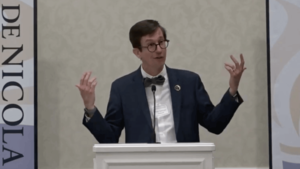
The de Nicola Center for Ethics and Culture hosted Santiago Schnell, the William K. Warren Foundation Dean of the College of Science, as the featured speaker at its annual Bread of Life Dinner on November 13, 2023. His remarks, entitled “Embracing Life: A Journey Through Life-Limiting Diseases and the Call to Protect Life,” were delivered to a record-breaking audience of more than 170 students, faculty, and staff.
The dCEC’s Bread of Life dinner is an opportunity for undergraduate and graduate students to listen to a campus leader reflect on the ways in which building and supporting a culture of life has personally affected his or her own life, and to share in a meal and conversation with members of the Notre Dame community. Past speakers have included Jennifer Newsome Martin, Dean G. Marcus Cole, Paolo Carozza, Rev. William Lies, C.S.C., and University President-Elect Rev. Bob Dowd, C.S.C.
In his remarks, Dean Schnell pointed out that in addition to his leadership role in the College of Science, he continues to conduct scientific research as an expert in the field of rare disease. “The Deanship for me is not merely a professional role, it’s a profoundly personal endeavor,” he noted. He attributed this motivation to the birth of his nephew, who was diagnosed with Haddad Syndrome soon after birth. “This extremely rare disease induces a shutdown of critical organs, such as the lungs, heart, and gastrointestinal system, during sleep,” Schnell explained.
Due to its rarity, Haddad Syndrome is considered an “orphan disease,” a condition largely overlooked by research institutes and pharmaceutical companies. After his nephew's diagnosis, Schnell decided that he would devote his professional life to study such rare diseases in the search for a cure. As a professional researcher, Schnell and his colleagues “have studied ten rare diseases, from rare forms of cancer and diabetes to, most recently, rare variants of epilepsy.”
Dean Schnell’s presentation then pivoted to the increasing reliance on assisted suicide as the preferred “solution” offered to patients facing terminal, life-limiting, or even mental health conditions. “In our advanced liberal society, we struggle to find solutions for many life-limiting diseases, yet ironically, some members of our modern society have developed an answer. They have become more proficient at facilitating the death of life-limited patients than at discovering effective treatments for them,” he said.
To counter this nihilistic response, Schnell encouraged the audience to recognize that misfortune and pain “are only the bitter part of our lives. The other part illuminates the courageous and heroic aspects of life and highlights the nobility of the human spirit when tasked with protecting human life. Embracing life, regardless of its challenges, allows you to experience the richness of love in its many forms.”
Schnell invited his listeners to accept that happiness and suffering are intertwined. “We must learn to appreciate not only the things that they have been given to us, but also find peace for things that they haven’t been given to us.”
“Life’s challenges can be daunting, but losing sight of the heroic potential within us could be our greatest loss. We were born to unravel the world's mysteries through our research and societal contributions. We are called to do good and fulfill God's creative work.”
Dean Schnell’s full presentation is available on the dCEC’s YouTube channel.
